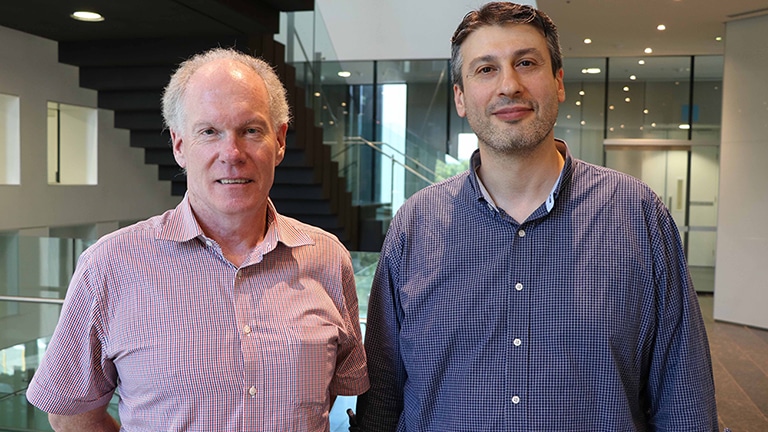
Hunter researchers will help advance vital prevention and treatment methods for thousands of people living with multiple sclerosis (MS) following a funding announcement.

Hunter researchers will help advance vital prevention and treatment methods for thousands of people living with multiple sclerosis (MS) following a funding announcement today from MS Research Australia.
Typically affecting young adults between the ages of 20 and 40, MS is an incurable chronic neurological disease that damages nerves and interrupts electrical messages to the rest of the body, eventually resulting in loss of motor function.
Laureate Professor Rodney Scott and Associate Professor Saadallah Ramadan from the University of Newcastle and the Hunter Medical Research Institute (HMRI*) will lead two separate projects into areas of MS research that have not been previously explored.
Professor Scott received $211,000 to investigate whether disease severity is associated with differences in the epigenetics of patients with MS.
“Epigenetics is essentially a mechanism to turn genes on and off in different tissues without changing the actual DNA sequence and is a way of regulating gene activity. These mechanisms are also influenced by environmental factors such as sunlight exposure, and could explain why some people have mild disease and others more severe disease,” Professor Scott said.
“This project is a new frontier in MS research that will assess epigenetic differences in people with mild disease and compare it to those with more severe disease to determine whether increased epigenetic change can explain these differences.
“This information will help identify new ways of predicting MS progression and could be used to develop better treatment strategies that prevent or reverse its debilitating symptoms.”
Associate Professor Ramadan was awarded $25,000 to investigate an effective treatment option to combat fatigue.
“Fatigue and depression are very common, highly significant symptoms of MS and are a major cause of reduced quality of life. Fatigue affects up to 80% of people and often presents early in the disease course” Associate Professor Ramadan explained.
“Fatigue management in MS is yet to be achieved, but we hope our proposed oral intervention containing selected vitamins and nutrients will improve the function of mitochondria, which are parts of the cell that produce energy.
“Improving this function might slow the neurological damage and have a protective effect, therefore allowing MS sufferers return to some normality in life by eliminating fatigue.
“The project will also use magnetic resonance imaging (MRI) to measure the neurological response to our oral treatment and assess whether it is a viable method to manage fatigue.”
The funding was part of MS Research Australia’s 2018/19 grant round where $1.75 million has been committed to MS researchers across the country.
* HMRI is a partnership between the University of Newcastle, Hunter New England Health and the community.
HMRI would like to acknowledge the Traditional Custodians of the land on which we work and live, the Awabakal and Worimi peoples, and pay our respects to Elders past and present. We recognise and respect their cultural heritage and beliefs and their continued connection to their land.

Hunter Medical Research Institute
We’re taking healthy further.
Locked Bag 1000
New Lambton
NSW, Australia, 2305



This site is protected by reCAPTCHA and the Google Privacy Policy and Terms of Service apply.
Copyright © 2024 Hunter Medical Research Institute | ABN: 27 081 436 919
Site by Marlin Communications
